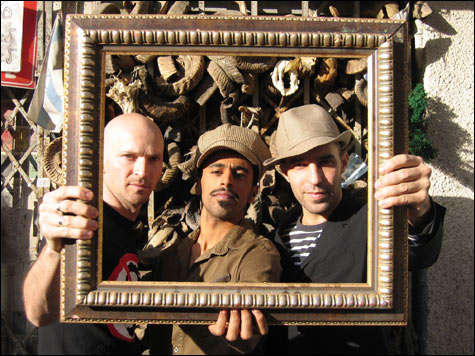
BALKAN BEAT BOX: Nu-Med is a transnational jazz-dance album, rooted in hip-hop beats and DJ electronics. |
The explosion of neo-Gypsy-hybrid music — one that hits Boston twice in the span of eight days in early October — started, you might say, with a cleverly worded flyer spied years ago by Eugene Hütz. As hordes of adventurous music fans from Kiev to Cleveland have learned, this Ukrainian-bred singer/guitarist/songwriter is the leader of the neo-Gypsy scene’s first and biggest band, Gogol Bordello, a multi-ethnic, multi-talented group of Brooklyn-based bombers who’ll drop their payload at the Roxy on Thursday October 11.
Of course, if Hütz sparked the neo-Gypsy explosion, it had been primed over decades by displaced artists joining their hopes and pride, their sadness and anger, to the creolized culture of the world’s greatest immigrant sanctuary, New York City. That includes not only the self-styled “Gypsy punks” in Gogol Bordello but also the wandering Jews at the core of the multi-ethnic Balkan Beat Box. This international musical kibbutz is a far different Gypsy-scene success story, connecting Gypsy-style music to its rich Middle Eastern heritage — as they’ll demonstrate when they transmogrify Gypsy punk into Mediterranean funk at Harpers Ferry this Wednesday, October 3.

In a way, though, even this story comes down to that flyer. “I saw a flyer that said ‘East Meets East,’ ” says the thickly accented Hütz over the phone. “It was a Hungarian and Ukrainian musicians’ night on the Lower East Side, and some kind of poetry reading along with that. So I just called the number on the flyer and said, ‘You gotta get me in, because I’m from the East!’ And they were like, ‘What the fuck? Did you just fall down from the moon?’ ”
Not far from it, actually. The 20-year-old budding musician moved to New York from Burlington, Vermont, where he had landed with his family in 1992, six years after they’d fled the Chernobyl disaster. Hütz arrived in New York with little more than his guitar, and he spent his first night sleeping under the boardwalk in Brighton Beach. But on seeing the “East Meets East” flyer, he managed to persuade the phone handler at the club, the Sidewalk Café, to book him for 10 minutes as “the opening for the opening act.” There he played music that joined his early love of Parliament-Funkadelic, Queen, and Jimi Hendrix to his grandmother’s traditional Roma music and to his devotion to second-generation hardcore punk from Fugazi to the Cro-Mags.
“All the people who were there [at the Sidewalk Café] were from the young Ukrainian community,” he explains. “They said, ‘Who the fuck are you, man? This is awesome!’ ”
Over the next decade and a half, Hütz worked that awesomeness to achieve an even more awesome effect. “As far as Eugene’s part in this, I definitely think it brought amazing energy,” says Balkan Beat Box co-founder Tamir Muskat over the phone from his balcony in Tel Aviv, as the sun sets over a hushed city welcoming Yom Kippur. “It helped all this music kind of come along again and get a new twist. And so I give him a lot of credit for this — but I wouldn’t say that anybody invented this, you know what I mean?”
That becomes clear when you compare the two bands’ new CDs — Balkan Beat Box’s second album, Nu-Med (JDub), and Gogol Bordello’s fourth, Super Taranta! (Side One Dummy). Each expands on a breakthrough disc — the sumptuous Balkan Beat Box and the astounding Gypsy Punks: Underdog World Strike, respectively. Each weds 21st-century styles to traditional minor-key melodies and instrumentation (horns for Balkan Beat Box, accordion and violin for Gogol Bordello). They even share an interest in Jamaican dub and a fancy for Spanish flamenco. There’s nothing surprising about these similarities. Israeli-born saxophonist and Balkan Beat Box co-founder Ori Kaplan was a former member of Gogol Bordello, and Israeli-born percussionist/producer Muskat cut a 2004 album on Stinky Records with the group under the heading Gogol Bordello vs. Tamir Muskat: J.U.T. (for “Jewish-Ukrainishe Freundschaft”).
Yet Super Taranta!, for all its Gypsy heritage, is a rock album, steeped in punk and tinged with the taste of metal. Although it doesn’t attain the career-defining cumulative power of 2005’s Gypsy Punks, it’s a broader, more intricate disc, basking in a bootstrap triumph that has garnered Hütz a 30-minute NPR interview, a DVD documentary, and a new friendship with Madonna (not to mention his role in the film Everything Is Illuminated). Nu-Med is a transnational jazz-dance album, rooted in hip-hop beats and DJ electronics, and turned far more toward the Middle East than toward Eastern Europe. And whereas Balkan Beat Box was a New York studio project between Muskat and Kaplan, Nu-Med expands the project into a full-fledged borderless band, with Yemeni-born singer/MC Tomer Yosef stepping to the fore the way an MC should.
Unfortunately, this parting of the musical ways also seems to augur a parting of company. “I played around with that kind of music for one year and got bored as fuck with it and moved on,” says Hütz of Balkan Beat Box. “That’s fine. They can be coattail riders, or original. I know what I choose.”